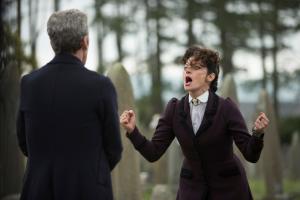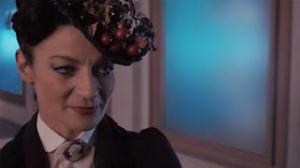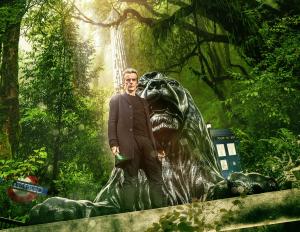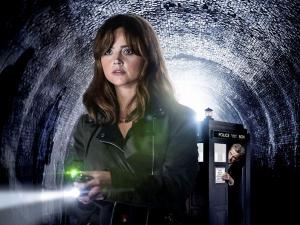Doctor Who Series 8 Soundtrack
Series 8 Original Television Soundtrack (Music CD)
Available 18 May 2015 From BBC Shop and All Other Stores
With just a few months left before Series 9 of Doctor Who hits our screens in Britain and across the globe, there is a new soundtrack release once again from musician-veteran Murray Gold. This covers the many exciting stories of Series 8 (along with the last Christmas special).This release certainly offers quantity, with 68 tracks spread out on the 3 CDs, and for the very most part also is one of quality.
Having enjoyed Matt Smith's tenure for the most part - but finding it a small step down from the days of David Tennant - I often found myself tapping my feet to the pleasant harmonies Gold would come up with, but wondering if more scope could have been employed. This new collection certainly offers quite a bit more variety and is a great barometer of just how eclectic Series 8 has been. 'A Good Man?' is the new theme for the latest Doctor and is ebullient; seeming to represent the phase that 'Twelve' is going through as he comes to terms with his new identity and markedly older look for many a regeneration. It recurs throughout various other tracks in the collection and always feels like a 'punch-the-air' moment. My personal favourite variation on the theme is the shrill 'Free Fall' which reaffirms the Doctor's bond with the TARDIS and also has him performing a Superman-eque fall without batting an eye.
There is a generous allotment of music for the Series 8 premiere 'Deep Breath' an episode which I found watchable but forgettable compared to its bedfellows in the first third of the television run. However as we all now know the identity of the antagonist who presided over a surreal 'heaven' domain, it is quite rewarding to have her theme be established, then somewhat cast aside, only to be authoritively echoed much later on. Clearly Gold was clued into the Moffat Masterplan and such bonds amongst the production team are part of the reason Capaldi's debut worked so well.
Several episodes well enough but don't stand out from their music - perhaps the sign of a smooth integration, which was actually intended -- including 'Into the Dalek' and 'Flatline' For the most part though each section of tracks has something to offer, and can go from the darkest of moods to the most frivolous. As regards the latter, I particularly enjoyed the Robin Hood escapade themes again on their own. That episode will never go down in the Who hall of fame, but it stands up better than I thought it would, so all credit to Gold and his associates there.
'Listen' is probably the most cerebral of all the episodes Moffat was credite with writing onscreen, and often had some eerie silences and a bleak sense of foreboding. But once again Gold knew just when to flip the switch and give some more immediate atmosphere with gentle instrumental pieces. But when a bit of bombast and sheer electricity is the order of the day, then look no further than the music for 'Mummy On The Orient Express' and the Series 8 multi-part finale. As for the 'Last Christmas' sections - representing a Yuletide episode I much preferred to the 2012 and 2013 efforts - then Gold is very much at his peak level, relishing the twisty-turny narrative and disturbing themes that story so adeptly conveyed. As a result the third CD contains almost all the 'top 10' of the sixty-and-eight total.
Almost all the tracks deserve multiple listens to do them justice and they are easily recalled in a person's 'inner ear' without straying into the irritatingly catchy type of music.
This whole awareness and care/attention is commendable indeed, but probably no less than one would expect given the composer's pedigree and substantial experience on Doctor Who, a show so full of versatility nowadays, that I myself hesitate to use sc-fi/fantasy to label it.
I would hazard a guess that the many Who aficionados out there confidently expect more excellence from team 'Moffat-and-co', as they to add more layers to the onion that is Capaldi's Time Lord. The soundtrack once again will likely rise to the occasion. .

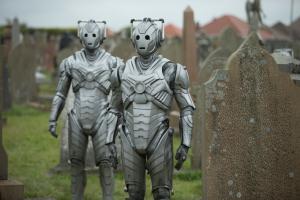 A further big highlight is Clara's brave pretence to her friend that she she has used Missy's techno-bracelet to have the 'normal' Danny restored to her. This scene of two people talking in an unremarkable cafe setting may seem low-key, but is acutely moving. The added dimension of the Doctor also covering his loss by lying that the Master for once told the truth is brilliant. I really doubt that Doctor Twelve will mellow out too much when he still has so much angst and loneliness to process.
A further big highlight is Clara's brave pretence to her friend that she she has used Missy's techno-bracelet to have the 'normal' Danny restored to her. This scene of two people talking in an unremarkable cafe setting may seem low-key, but is acutely moving. The added dimension of the Doctor also covering his loss by lying that the Master for once told the truth is brilliant. I really doubt that Doctor Twelve will mellow out too much when he still has so much angst and loneliness to process.